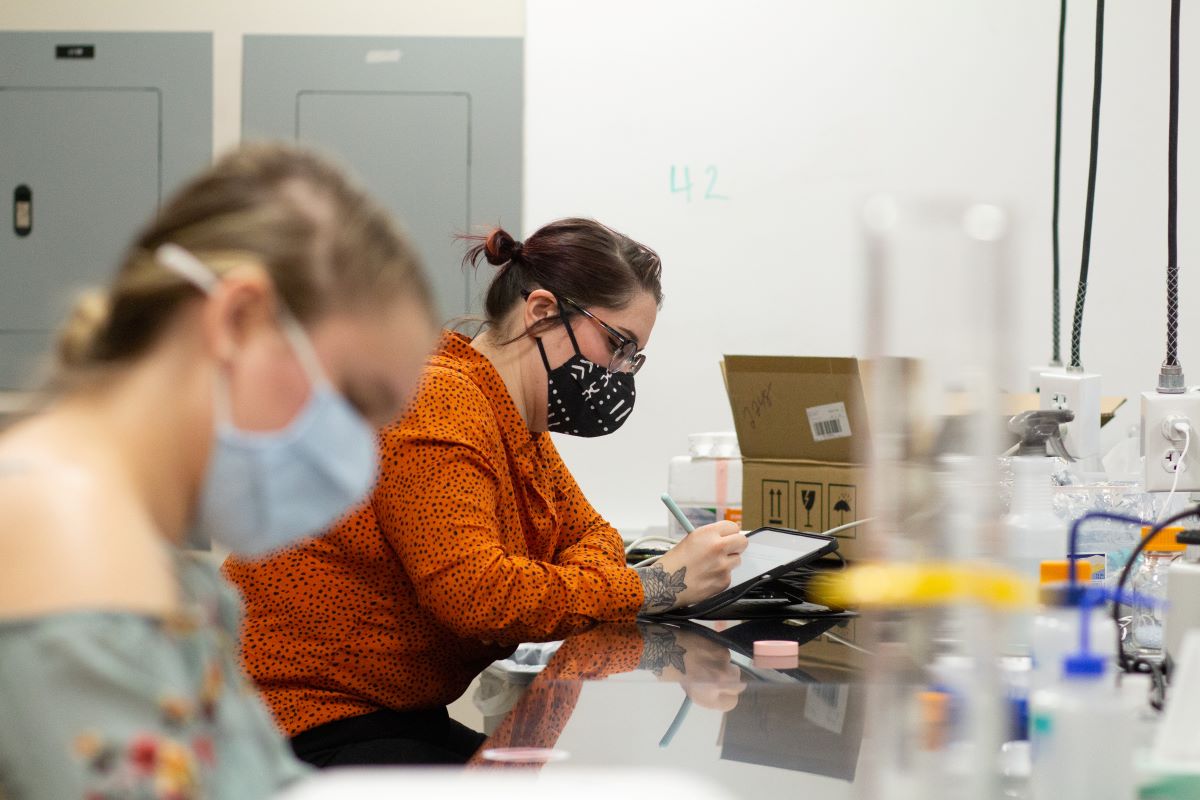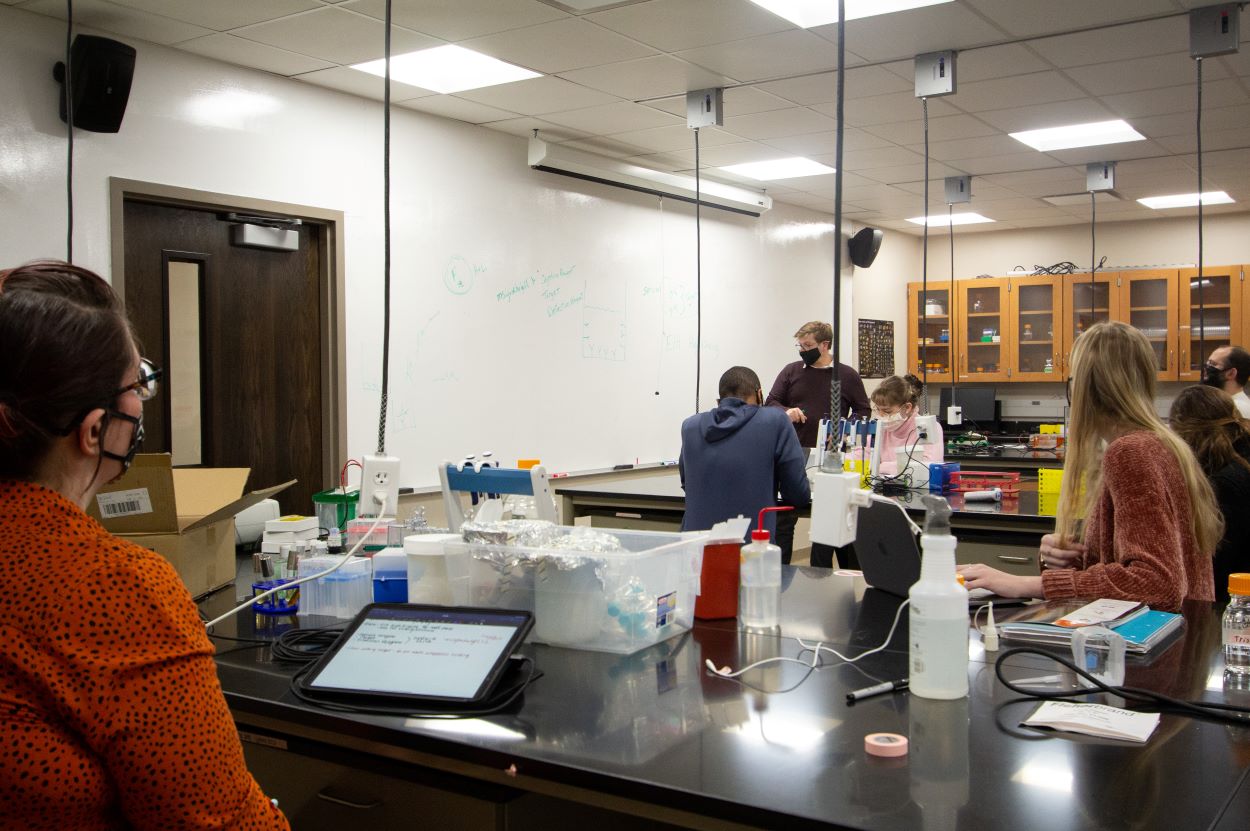Local bioscience companies collaborate with biotechnology program for capstone research

Since its beginning in 2016, the KU Edwards Campus Bachelor of Applied Science in Biotechnology program has cultivated relationships with industry organizations in the Kansas City area to enrich its students’ experiences in the classroom, and to provide valuable employment and recruitment opportunities.
“Bioscience companies are supporting KU research, which makes this particular education experience sustainable from a university standpoint,” said Randy Logan, director of the biotechnology program at the KU Edwards Campus. “Undergraduates rarely get to do this level of autonomous research.”
This semester, the biotechnology program entered into new partnerships with area businesses that will allow students working on their capstone research projects to conduct cutting-edge research. The organizations, who are providing funding for the student projects, also get to build relationships with the students they support, opening the door for valuable classroom interactions as well as access to rising professional talent.

2021 biotechnology seniors pictured from top left to bottom right: Maya Abuhijleh, Emily Munden, Richard T. Oliver, Sydney Rebel, Suzie Zell, Jackson Cobb, Steve Harris, Andy Cardona Orellana and Alaina Coughlin. Each year, seniors conduct capstone projects, which challenge them to apply their technical and research skills gained through their studies.
One organization that’s providing blanket support for student research projects this semester is Catalent. Adam Allmon, human resources director at Catalent’s Kansas City facility, says this new partnership helps broaden students’ awareness of the careers that are possible after they graduate.
“I think it’s extremely valuable for businesses to further connect with higher ed in order to best prepare students for success in the workplace and create additional exposure to careers they might not have otherwise been thinking about,” Allmon said. “It also helps introduce our company and the various career opportunities to students. We’ve already been fortunate enough to hire graduating students into full time roles here at Catalent.”
Renea Creech, associate scientist and outreach program lead at Hill’s Pet Nutrition, said the company’s support of the program helps encourage future generations of bioscience professionals. “Hill’s is excited to partner with the biotech program because we see an opportunity to support local students who want to work in the biosciences field,” Creech said. “As previous bioscience students, we know how important those hands-on technical skills are, and this gives us the opportunity to show how those techniques are used in the industry.”
Hill’s is providing direct sponsorship of a capstone project by biotechnology senior Sydney Rebel. Her research focuses on anticancer properties in local mushroom species.
“The sponsorship from Hill's has allowed me work on my project without having to worry about making sure I don't run out of any of the components I need,” Rebel said. “This is important because I can focus on planning and running my assays properly versus trying to conserve things and possibly having to cut corners.”
Creech said Rebel’s research stood out to Hill’s for its applicability to the company’s work in sustainability. “At Hill’s we strive to be on the cutting edge of food science and novel ingredient research to help enrich and lengthen the special relationships between people and their pets,” she said. “Sydney’s interest in determining anti-cancer properties of local mushroom species resonated with our ingredient screening and sustainability programs. Her excitement and passion for her project came through when we met. It felt like the perfect fit.”

For Rebel, the opportunity to conduct her research with the guidance of industry professionals has reinforced her career goals. “Ultimately, I would like to find a graduate program where I can continue my research on cancer and help discover or develop new treatments that can improve the quality of life for the patient,” said Rebel.
Allmon says representatives from Catalent are looking forward to seeing the final results of students’ research at the end of the semester. “We will be excited to sit in on the final presentations to learn more about how our funding was used to support research!”
Supporting student research is something Boehringer Ingelheim Animal Health also recognizes as an important way to prepare the future workforce.
“We believe in creating a healthier tomorrow for people and animals, and supporting local universities with biotechnology programs is one way to do that,” said Scott Davis, Director of Boehringer Ingelheim’s site in St. Joseph. “Partnering with the University of Kansas lets us foster conversations about what we do and answer students’ questions about animal health. It also helps prepare them to enter the scientific workforce with the skills they need for success.”
The developing collaborations between the biotechnology program and local organizations offer promising future opportunities for students to develop their skills and contribute to innovation in the biotech industry.
“The support from industry organizations provides integral support for students and their capstone projects,” said Logan. “We hope to grow these connections in years to come.”
Top photo: Biotechnology senior Sydney Rebel works on her project during a spring 2021 lecture in the biotechology lab at the KU Edwards Campus in Overland Park.
Learn more about the Bachelor of Applied Science in Biotechnology Degree.
The Bachelor of Health Sciences program is supported by the Johnson County Education Research Triangle (JCERT).





